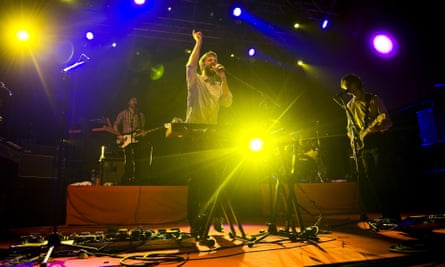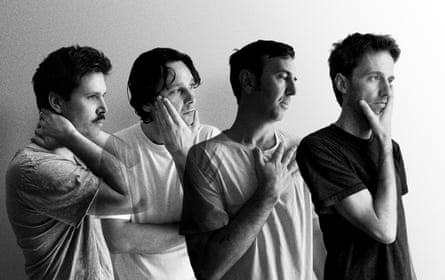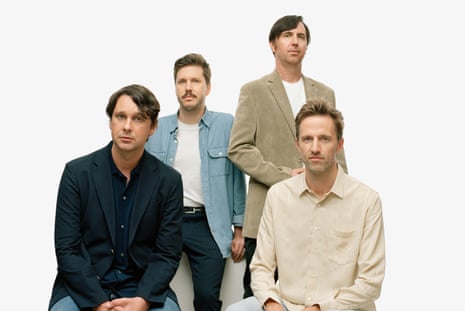After almost two decades soundtracking nightclubs and parties, Dan Whitford is getting tired. When the founding member of the indie dance outfit Cut Copy decamped to Copenhagen in 2016, he began sussing out the local techno scene at warehouse raves. “I went to a couple when I first got there and then thought, ‘That’s a bit past my bedtime.’”
It wasn’t just the scene that turned him inward; the subzero winter and isolation from the familiarity of home began influencing the music he was making. The result, Cut Copy’s new record Freeze, Melt, is the band’s most contemplative and insular.
These aren’t the synthy pop songs that first emerged on 2004’s Bright Like Neon Love and became timeless indie anthems on the band’s 2008 follow-up, In Ghost Colours. “It’s more of a put your headphones on and sit on the couch and just bliss out vibe,” he says.
The growth of Australia’s indie-electro scene coincided with the rise of Cut Copy and their labelmates on the now-defunct Modular, including the Avalanches and the Presets. Now, almost 20 years after forming, Cut Copy still pack dancefloors and clubs to play for people who were there the first time around – or have caught up since.
Or at least they did. When there were dancefloors and clubs to fill. When the very idea of sweating bodies pressing against each other didn’t feel like a memory of a past life. Whitford describes seeing, on social media recently, someone he knows DJing at an outdoor party in Germany. “I honestly had to look at this post about five times before I could understand that a gig was happening. My mind was so blown. What world is that?”
“Our bread and butter over the years has often been these sweaty dancefloors and tightly packed festival crowds. And it’s hard to imagine what context that’s going to exist in in the future.”
In mid-March Cut Copy played their “last gig for god knows how long”. That weekend, when the prime minister, Scott Morrison, delayed the outright ban on mass gatherings because the football was on, more than 10,000 people came together in Melbourne to see the synth-pop legends New Order at Sidney Myer Music Bowl, supported by Cut Copy and the dance outfit Confidence Man. Besides some hand-sanitising stations distributed around the amphitheatre and bar staff wearing gloves to serve drinks, we could convince ourselves it was just any other show. Friends hugged one another and then laughed, remembering too late to elbow-bump instead. These were the “before” times, and by the time we heard the opening percussive notes of Cut Copy’s Standing in the Middle of the Field, all awareness of social distancing was forgotten – something it’s shameful to admit now, in the “after”.

After the set, Whitford says, he went straight out into the crowd. I’m watching him, over Zoom, pumping his hands in the air as he describes it. “I didn’t have my shirt off or anything, but I was losing my mind to New Order as if it was 1989. I think I did forget about [coronavirus] for a good hour and a half or however long they played for. I was just really perfect. We came back down to earth the next day and realised, well, that’s it for a while. But if you’re going to go out on a show, that was a pretty good one to go out on.”
In a well-meaning effort to bring the live music experience back into our locked-down lives, livestreamed shows have taken off around the world. But an absence of the physicality of performance and reliance on a static camera means these are best suited to singer songwriter-style artists; the energy required for dance music can’t be replicated in a two-dimensional experience, beamed out of one living room into another.
The feedback he gets from playing for a crowd, Whitford explains, doesn’t translate either. “If there was, like, a holographic version of Zoom or something, maybe that would do the job. But it doesn’t quite cut it.”
On an episode of his podcast, Ezra Klein explained how unsettling the uncanny valleys of our new online world had become: “I don’t think I’m the only person who finds the digital simulacrums of the life I had more exhausting, more dispiriting than not trying to recreate … [it] on a screen.” Attempting to create a sensory experience out of one that flattens the senses feels hopeless.
Critiquing the role of technology in our lives is a theme of Cut Copy’s album, too. The first single, Love Is All We Share, is a meditation on “the anxieties of imagined future times, as technology becomes more all-consuming,” Whitford has said.
But the insular and personal lyrics – which paint a lonesome scene, of being numb and unknown, in which the one constant is “only love” repeated on a loop – took on new relevance when it came time to release it in June, when opaque tape was peeled off webcams around the world so we could see each other’s faces, information privacy be damned. The sentiment of Love Is All We Share, he says, “was perfect for that moment, where people couldn’t really share anything physically, except for their feelings towards one another using the technology they had available”.
The record’s turn towards the ambient, and away from the temptation to be euphoric, makes it perfect for this specific moment – but it also feels as though it might be a timeless one. It certainly wasn’t a result of Covid; Cold Water, the first track Whitford made for Freeze, Melt, came together in 2018. When Cut Copy first sent tracks to their manager, Whitford says his response was one fans might echo: “Cool. Where’s the banger?”
“We don’t want to piss people off but we felt like we’d given so much of our time and effort to making a lot of music that would work on a dancefloor. I think people’s idea of what we were about had become so defined that that just lost interest for us.”

Inspired more by the likes of Four Tet and Floating Points and Frank Ocean’s 2016 album Blonde, Freeze, Melt takes its time and resists the urge to offer an easy release. “I haven’t gone off dance music or anything, but I think there was this little voice, a little version of Dan Whitford on my shoulder saying, ‘Hey, put a kick drum on it. Where’s the drop?’ And I had to just not listen to that.”
Cut Copy’s songs clearly satisfy a personal, artistic urge, but I ask him, can dance music more broadly even exist without the communal, deeply physical way his audience experiences it? Can we have one without the other? “I would say no,” Whitford responds.
The effects of the pandemic, he thinks, might “force a bit of an evolution, maybe temporarily, in the kinds of music that people are making. I mean, for me personally, it’s hard to imagine trying to make a big club track right now when there’s no clubs for it to be played in and no dancefloor for people to enjoy it on. It doesn’t really make sense.”

Comments (…)
Sign in or create your Guardian account to join the discussion